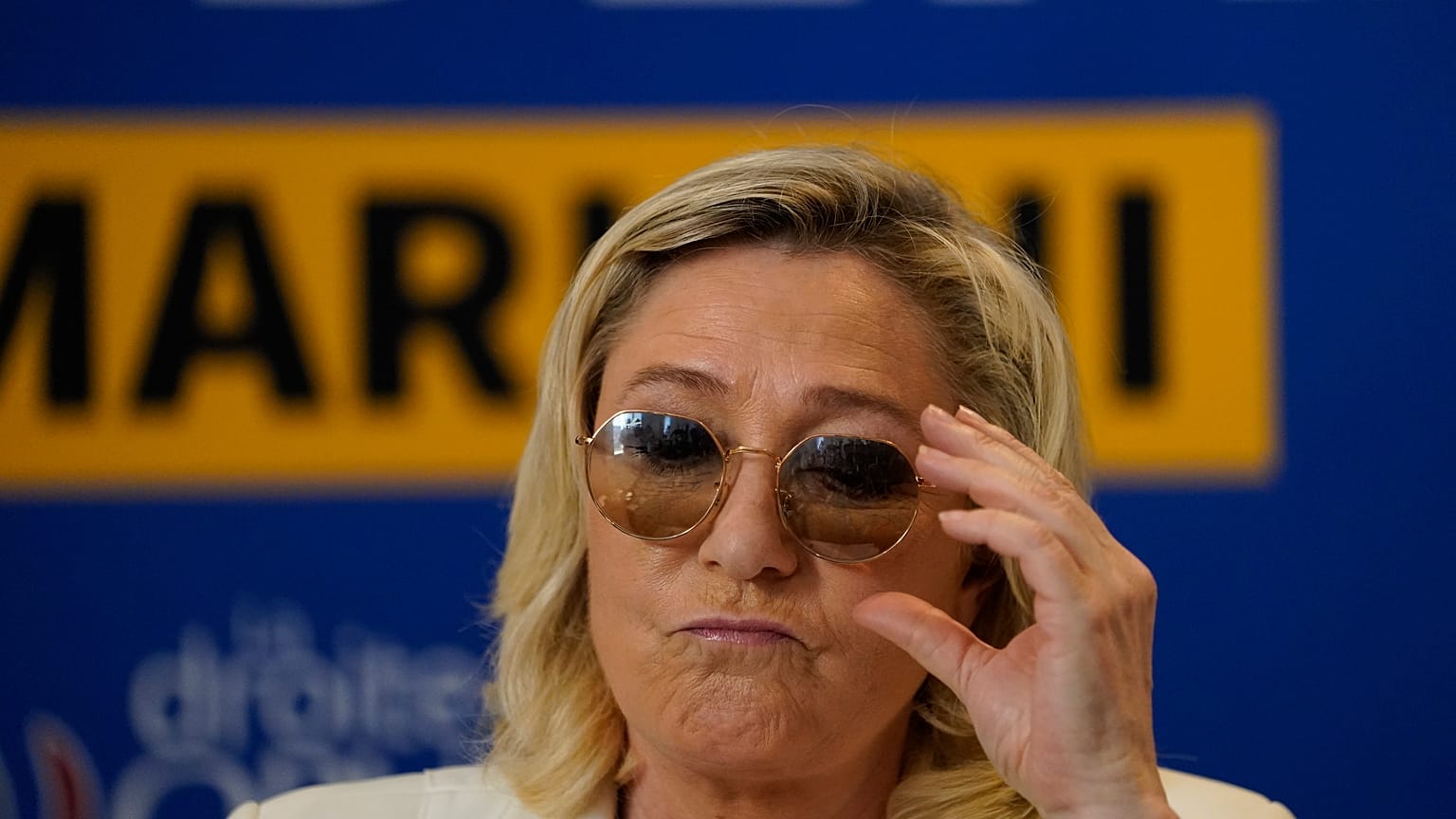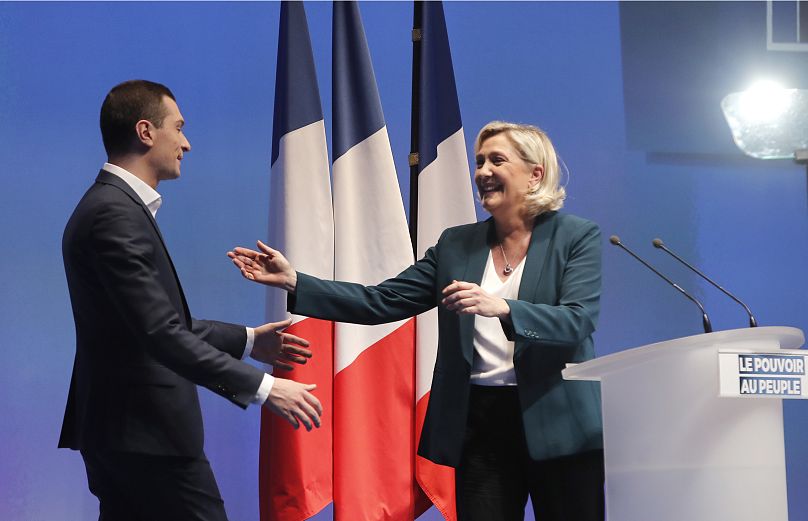National Front founder Jean-Marie Le Pen says the far-right party did poorly at Sunday's regional election because it lost its radicality and "virility." Is he right?
Former French far-right leader Jean-Marie Le Pen has an explanation for the poor showings of his daughter Marine Le Pen's National Rally at the French regional elections on Sunday. Virility!
"Either Marine Le Pen goes back to the basics on immigration and insecurity" with "a resumption of virility and clear positions" or the party will face "disappearance," the founder of the National Front said in a video broadcast on Wednesday.
"Either Marine Le Pen finds the tone of previous fights, or else she will gradually fade," he warned.
The founding father's criticism will loom large over the National Rally’s congress to be held this weekend, just as Marine Le Pen is to be formally designated as the party’s presidential candidate ahead of the 2022 election.
The party failed to win a single region at Sunday's regional election, contrary to polls forecast, and amid a record low turnout. Compared to the last election in 2015, it even lost 30% of its councillors.
In the southern region known as PACA, far-right candidate Thierry Mariani, a longtime favourite, suffered a resounding defeat to the mainstream right-wing incumbent, Republican Renaud Muselier.
Meanwhile, the vice president of the National Rally, Jordan Bardella, took a humiliating third place in the Paris region election.
The party’s weak showing has raised doubts over Marine Le Pen's strategy to polish the image of the party and, some say, gutting it of its anti-system message.
It has also thrown a shadow of doubt over expectations that the presidential election in 10 months will be a showdown between Marine Le Pen and current President Emmanuel Macron.
Has Marine Le Pen’s “normalisation” strategy failed and what are the implications for the 2022 presidential race?
Euronews analyses the state of play of the French far-right as the National Rally is due to hold a closely watched party congress.
Party divided over normalisation strategy
Party officials appear divided about Marine Le Pen's normalisation strategy.
MEP Gilbert Collard, who will boycott the congress in Perpignan this weekend, said the so-called "de-demonisation" of the party was a "trap."
He acknowledged Marine Le Pen faced "a momentary crisis of confidence" but added: "We can judge her performance after the presidential election."
A local party official, Bruno Lerognon, resigned on Monday following the regional election. In a letter sent to Le Pen and seen by AFP, he slammed "an absurd strategy of opening up."
But according to National Rally Mayor of Perpignan Louis Aliot, the debate on normalisation is irrelevant.
"When we were too radical, we were told: you will never get there, and now that some people find us not radical enough, we are told: you never get there," he told Sud Radio on Friday.
Rather than the less radical positioning of the National Rally, Aliot and others in the party are blaming low turnout with only one voter in three going to the polls.
"We need to question ourselves to understand why our voters did not show up. Of course, this is part of a broader context. But all the same, we have our share of responsibility. We have to analyse things well and respond to them in an efficient manner," Aliot said.
Lack of credible leadership alternative
Jean Yves Camus, Director of the Observatory of Radical Politics at the Jean Jaures Foundation, noted that while the far-right leader faced criticism, for them to have an impact "it would take someone who could pose as a challenger to Marine Le Pen. And for the moment, that is not the case."
The French political expert noted that Le Pen's popular niece, Marion Marechal, who has left the party, was currently not endorsing that role.
The party congress will vote a leadership reshuffle, with Marine Le Pen due to temporarily step away from her duties as party leader while she focuses on the 2022 presidential race.
"Marine Le Pen is going to step back and temporarily give the movement's keys to someone else," Camus told Euronews, noting that this will lead to "a form of competition between Jordan Bardella and Louis Aliot."
Outside the party, another far-right alternative for 2022 could be editorialist and pundit Eric Zemmour, who is reportedly mulling a presidential bid.
But according to Camus, "Zemmour's electoral capital is weak." Furthermore, projections show that he would take more votes to mainstream conservative party the Republicans than to Marine Le Pen, the expert told Euronews.
Implications for 2022 presidential race
In this context, the expert warned that the National Rally should not be buried too quickly.
"The failure of the National Rally at the regional elections needs to be put into perspective," he said, noting that it remained the second-largest political force in many French regions. "It is a defeat but the National Rally remains a very potent political force," Camus told Euronews.
Furthermore, turnout at presidential elections in France tends to be much higher than for local polls. In 2017, voters' participation was at 77%, Camus noted.
In 2022, the pandemic will likely be "further behind us," the expert added, allowing greater mobilisation of voters.
According to pollsters, despite Macron and Le Pen's weak results at the regional elections, the expected stars of the presidential race have not yet failed.
Europe's far-right parties joining forces
The National Rally is also relying on alliances with other European far-right parties to boost its credibility ahead of the presidential election.
On Friday, Marine Le Pen along with Poland's Jarosław Kaczyński (Law and Justice), Italy's Matteo Salvini, Spain's Santiago Abascal (VOX) or Hungary's Viktor Orbán (Fidesz, Hungary) signed a joint statement responding to the bloc's current debate on the future of Europe.
"The European Union needs a deep reform, because today instead of protecting Europe and its heritage, instead of allowing the free development of European nations, it becomes a source of problems, anxiety and uncertainties in itself," the statement read.
Camus noted that the text showed "the lines were shifting" on a European level, notably after Orban left mainstream conservative political group European People's Party (EPP) for the European Conservatives and Reformists (ECR) amid constant disputes over the rule of law in Hungary.
For Marine Le Pen, the joint statement is also an opportunity to show she has "political allies who are in power," the expert told Euronews, referring to Orbán in Hungary and Kaczyński in Poland.
Every weekday, Uncovering Europe brings you a European story that goes beyond the headlines. Download the Euronews app to get a daily alert for this and other breaking news notifications. It's available on Apple and Android devices.
















